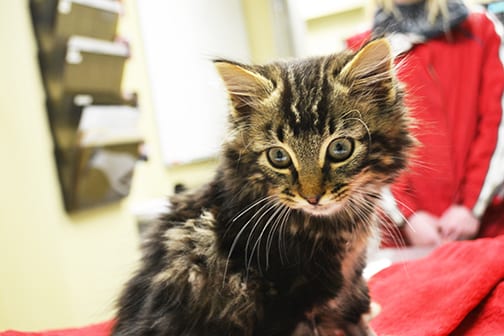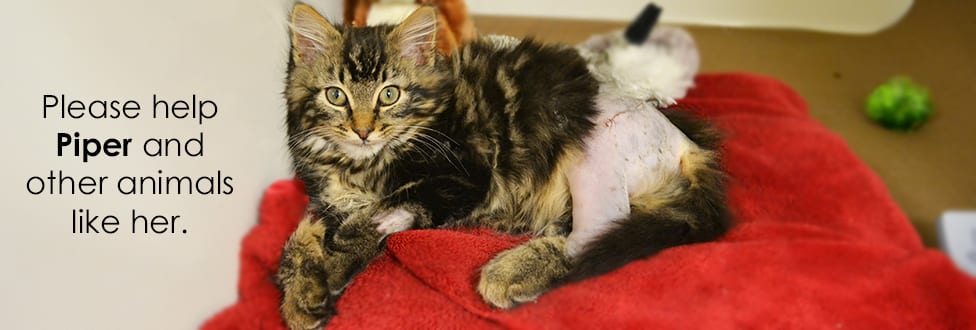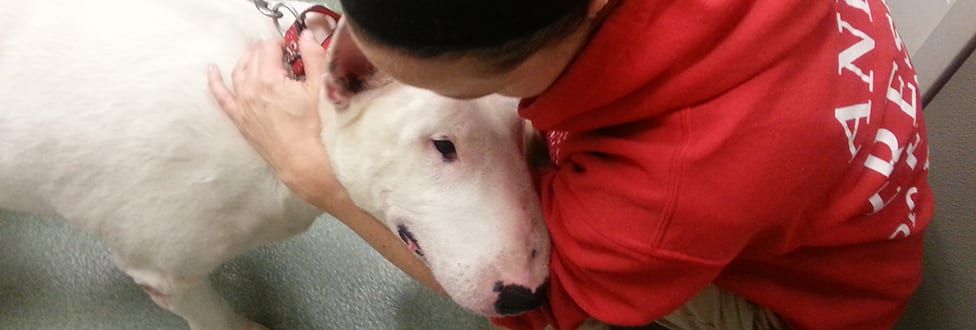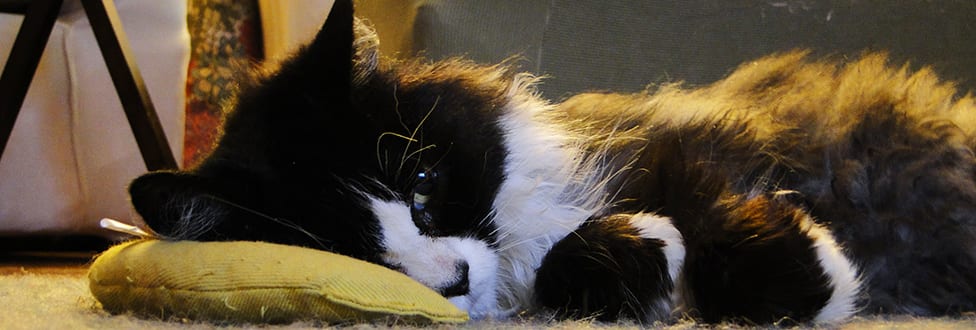Piper the Kitten Getting Special Care at the ARL
“She’s like our very own Tiny Tim”
 The Animal Rescue League of Boston’s (ARL) newest addition, little Piper the kitten, is recovering from delicate surgery performed on Monday to repair her broken back leg.
The Animal Rescue League of Boston’s (ARL) newest addition, little Piper the kitten, is recovering from delicate surgery performed on Monday to repair her broken back leg.
Just as the cold weather hit, kind Samaritans discovered the 6-8 week-old brown tabby all alone and struggling to walk near an ice cream shop in Orleans, MA. After police brought her to the ARL’s Brewster shelter, ARL veterinarian Dr. Kyle Quigley recommended bringing Piper up to Boston to explore all the options for repairing her leg.
“Piper was anemic, dehydrated, and clearly in some discomfort because of her broken leg,” Dr. Quigley explained. “Because she was so little, we wanted to make sure we helped her heal with minimal pain.”

An x-ray of Piper’s leg with the pins and steel plate post surgery.
The ARL funded Piper’s surgery at Tufts Veterinary Emergency Treatment and Specialties in Walpole, MA, where veterinary surgeons inserted a steel plate and pins to repair the serious fracture in her thigh. The organization will continue to help Piper rehabilitate over the next 6-8 weeks and begin the process of finding her a permanent home.
“She’s like our very own Tiny Tim,” said Marianne Gasbarro, the ARL’s Boston shelter manager. “She got the treatment she needed just in time and will have a much better life in the new year ahead.”
The ARL expects Piper’s medical costs will top $2,000 with surgery and after care. The organization does not receive any government funding and relies solely on the generosity of supporters to help stray animals like Piper recover.
Make a donation to help Piper and other animals just like her.






 Thanks to generous funding from the Stanton Foundation, CSD built an impressive body of work, including:
Thanks to generous funding from the Stanton Foundation, CSD built an impressive body of work, including: Here at the Animal Rescue League we feel truly honored to have served as the incubating organization for such a tremendous asset to the field of animal welfare. Thank you to the Center for Shelter Dogs for 6 years of incredible work that has helped more homeless dogs get a chance at a better life. This work will not only continue, but will also have an even greater impact on the well-being of dogs in the future.
Here at the Animal Rescue League we feel truly honored to have served as the incubating organization for such a tremendous asset to the field of animal welfare. Thank you to the Center for Shelter Dogs for 6 years of incredible work that has helped more homeless dogs get a chance at a better life. This work will not only continue, but will also have an even greater impact on the well-being of dogs in the future.











 Wally’s mom had given birth to him and his siblings about two years ago outside the prison, and continued to live in the vicinity as her family grew up. Prisoners and guards had kindly fed and cared for the cats ever since.
Wally’s mom had given birth to him and his siblings about two years ago outside the prison, and continued to live in the vicinity as her family grew up. Prisoners and guards had kindly fed and cared for the cats ever since.